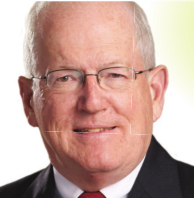And New Hampshire passes the primary voting test
Stephen E. Merrill, governor of New Hampshire from 1993 to 1997, died in early September at age 74. For many in New Hampshire, this was a shock, although those close to him apparently knew he was ill. He was a man of rare good disposition and humor.
This writer first met Steve in philosophy class, in Hamilton-Smith Hall at UNH, in 1968. We shared the confusion created by the presentation of the ideas of great philosophers. Over the next decades, our careers intersected often, and it was a friendly association. He served the state as counsel to the governor, attorney general, governor and advisor to others.
At his memorial service at State House Plaza Concord, speaker after speaker recalled Merrill’s accomplishments, good humor and ability to laugh at himself. Two Governors Sununu, Governor Benson, Senator Ayotte, Chief Justice Broderick, perhaps Merrill’s closest friend, and Merrill’s sons did him proud.
It was good to see New Hampshire’s two parties avoid partisanship for a time, as both sitting U.S. senators, a congressman, legislative leaders present and past, and candidates for office, all paused to come together to honor the former governor, and remember what should unite us, which is to serve the state.
The Sept. 8 primary was not only a test of candidates but also of the election system in this time of pandemic.
The results were not terribly surprising, with Governor Sununu handily winning the GOP nomination for a third term, and the three incumbent Democrats in the U.S. Congress obtaining their nominations, some unopposed.
Open seats in the New Hampshire Senate and Executive Council saw new faces appear, with most incumbents winning re-nomination. The most watched and closest race, for the Democratic gubernatorial nomination, was won by Senate Majority Leader Dan Feltes of Concord, who beat Executive Councilor Andru Volinsky. The race, in which Feltes had establishment support and a big lead in terms of campaign funds, was tighter than some expected, with the liberal wing of the party supporting Volinsky, a supporter of Bernie Sanders who refused to take “The Pledge,” and who advocated many substantive changes to how New Hampshire does business.
Corky Messner, Matt Mower and Steve Negron — the GOP candidates chosen to oppose incumbents Shaheen, Pappas and kuster — have a real uphill battle, both in fundraising and name recognition, and there is little time left until the November election.
After months of study, changes in the law of how we vote, efforts to increase absentee voting, and changes to the physical layout of polling places, all eyes were on the actual election process.
There was a record number of absentee votes cast. In some places, up to 70% of the votes were absentee. The total vote also set a record. The ability to process ballots prior to Election Day appeared to help make counting smooth, so that results were largely known election night.
On primary day itself, I accompanied Secretary of State William Gardner and Anthony Stevens of his staff, as they visited five polling places, to see how voting was working under new conditions.
In Franklin’s Ward 2 and in New London, the polling places were moved from their traditional sites to larger quarters, to allow for social distancing. In those places, as well as in Bristol, Danbury and Windsor, personal protective equipment, alternate polling places for those few who did not or could not wear masks, and visible rearrangement of the voting facilities, seemed to work.
As we talked to the moderators, it was clear they all had taken their jobs very seriously, were accommodating voters’ various needs, and had taken advantage of the chance to be trained and to preprocess the absentee ballots.
Also, and gratifying to this writer who had the chance to chair the study committee on how all this was to be done, most of them appreciated all the hard work which had been done to prepare them for this election.
Of course, the primary was just the testing ground for Election Day in November.
People should request their absentee ballots now and have a plan for being sure they are received, so the process is as successful as the primary process was. That will assure that New Hampshire’s tradition of high turnout and trustworthy elections can continue, even in a pandemic.
Brad Cook is a Manchester attorney. The views expressed in this column are his own. He can be reached at bradfordcook01@gmail.com.